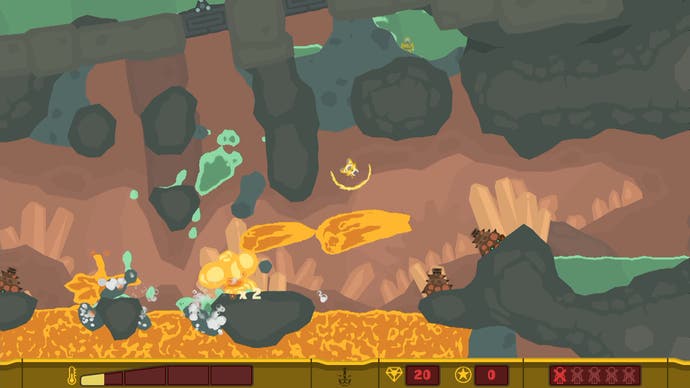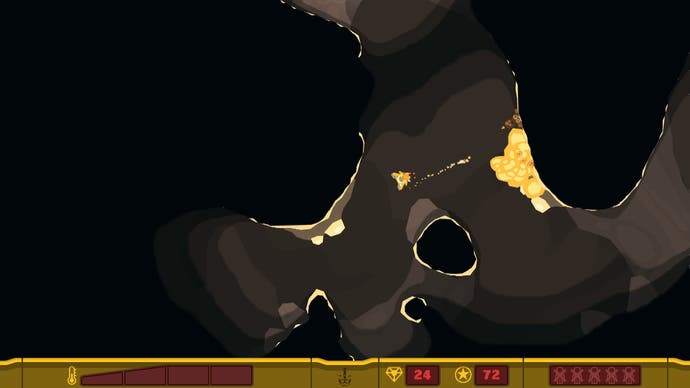Pixeljunk Shooter 2
Spouting lava, lava, lava.
As with the first game, you need to rescue all the survivors on each screen to move onto the next, with the fifth screen of each stage holding the exit. You're allowed five deaths, though collecting 100 stars from defeated enemies reduces the body count by one. Because there are more critters to kill, it's easier to rack up the combo count and hoover up plenty of stars, compensating for the noticeable increase in difficulty.
Unfortunately, the same can't be said of the gem-hunting. The fifth stage of each level requires a certain number of diamonds to unlock, and while the first game's shorter and easier stages encouraged more thorough exploration to locate them all, it can be a real grind here. Some you'll only get a single opportunity to grab before they're buried under a sea of lava, or hidden forever from a moving light that might have advanced past their location before you even realised they were there. As collected gems don't count towards your tally until you've completed all five screens of a stage, it can take upwards of 15 minutes to snare just a couple of gems to gradually work your way towards the total required to open up the final stage of the third chapter.
(As a side note, it really is infuriating to be killed by an enemy that appears from nowhere just as you collect the final survivor on a screen, especially when that enemy is gittish enough to hide behind a gas bubble during a hurried escape from a rising lava tide.)

The change of pace from its more sedate predecessor – Shooter now makes much more sense as a name - is one that will win some new fans but alienate others, especially as it invites more direct association with other twin-stick arcade blasters. Given that most of the threats – especially in the early stages – come from simple re-skins of the turrets, bats and burrowing baddies of the first, it's not a comparison that does Shooter 2 any favours. The boss battles are inventive, but otherwise enemies merely represent an annoyance, an obstruction to progress rather than an engaging foe to fight.
Fortunately, the new two-player mode is a saving grace. Each different arena houses seven workers, with the object being to rescue more than your rival. The twist is that you can only save them on your turn, with your enemy simply tasked with hunting you down before roles are reversed. The caverns have their own unique environmental features, from one with severe tectonic tremors to another where showers of hot magma can be triggered to cascade onto your opponent. There's a decent selection of power-ups that can be purchased to improve your ship's offensive capabilities or chances of evading detection.

It's perhaps a little unbalanced, with beginners at a distinct disadvantage until they've earned enough money to buy a few new powers, while most players will simply camp outside their opponent's base, waiting to greet their triumphant return with a hail of missiles. But even when losing seven games on the trot to an outrageously skilled Spanish opponent – and I'm definitely speaking hypothetically here – it's a lot of fun. Another nice touch allows you to collect credits in your ship while waiting to be matched up; a great idea when you're just a few 'Q dollars' short of that handy sonar.
But while this multiplayer mode is one of the game's most successful additions, it's curious that a series known for rejecting convention seems to be embracing the 'bigger, better, more' mentality here. The name PixelJunk suggests something throwaway, and it's perhaps telling that, in striving for substance, Q-Games has come slightly unstuck. Some will undoubtedly relish the tougher challenge, most will welcome its greater longevity, but there's no denying that this quirky series has lost a little of its unique charm.








